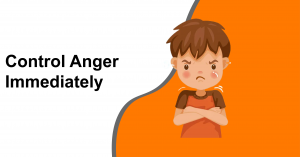Overview
It’s important to learn how to stop being angry. If you ask ten men what makes them angry, you’ll receive ten different answers. For some, it’s all about the situations: trapped in traffic, long lines at the checkout, 20 minutes on wait, and then being cut off. According to some studies, the average adult is angry once a day and annoyed or frustrated three times a day. What’s your take on this?
It’s usual to get irritated from time to time. When anger begins to affect a person’s everyday life and drives them to respond in ways that may harm themselves or others, it becomes a problem.
When you’re going through a difficult and stressful scenario, it’s natural to feel angry now and then. It’s ok to be angry. Anger may help us get through difficult feelings and situations, as well as inspire us to modify things in our lives that we don’t like.
When anger affects a person’s everyday life and/or relationships, it can become a problem. Anger can be expressed in both good and unhealthy ways. Some people may become violent or passive-aggressive toward others, while others may try to conceal and repress their anger. When people adopt poor coping techniques to deal with their emotions, it can lead to additional physical and emotional problems. But, there are tactics you may use to better manage your emotions and can impair your regular life. This blog will talk about all those tactics and strategies which will help you in handling and managing your anger and how to stop being angry.
Anger | How to Stop Being Angry

Let’s first understand, what is Anger? Anger is a basic human emotion that affects everyone. Anger is frequently seen as an unpleasant feeling that happens when we believe we have been damaged, mistreated, or opposed in our long-held beliefs, or when we are confronted with hurdles that prevent us from achieving our goals. It is a strong emotion that you experience when anything goes wrong or when someone does wrong to you. Stress, frustration, and irritation are common feelings associated with it.
Now, what is the rage? Rage is something that everyone experiences from time to time. It’s a totally typical reaction to challenging or stressful conditions. Anger is a physiological, emotional, cognitive, and behavioral response that is linked to a variety of other physiological, emotional, cognitive, and behavioral responses. Muscle tension, such as a tightened jaw, increased heart rate, sweating, headache, or dizziness, are all physical indications of rage. Frustration, impatience, anxiety, guilt, and shame are all emotions related to anger.
What is Anger Management? | How to Stop Being Angry

Anger management is a technique for reducing the negative impacts of anger. You can’t make the anger go away because it’s a natural reaction and sensation. You need to first understand what causes anger to you. However, you can improve your anger-management skills in many ways. The aim of anger management therapy:
- Is to help minimize stressful or anger-evoking situations, and
- To improve self-control, and help you healthily express your feelings.
Anger management techniques involve understanding your triggers and responses to anger, learning strategies to manage or diffuse it, and changing thoughts and attitudes related to anger. Some of these techniques are mentioned below.
What are the Common Symptoms that show your need for Anger management? | How to Stop Being Angry
If you experience any of the following symptoms when confronted with a difficult situation, you should evaluate whether you have a problem managing your anger or want to learn how to stop being angry:
Physical symptoms:
- You react fast and aggressively to minor problems.
- You find that you the favorite color are unable to control angry emotions
- Your heart starts to beat faster, and your muscles tense up.
- Your fists become clenched
- You find it difficult to calm down
- You feel frustrated with your actions
Behavioral symptoms:
- Your frequent expressions of anger result in punching objects
- You break things in outbursts of anger
- You find yourself often shouting at people
- You make unfounded accusations to those around you
- You are constantly arguing with others
- You get into arguments over minor issues and punch people.
How to Stop Being Angry? 10 best ways to How to Stop Being Angry

Do you get frustrated whenever anyone cuts you off in traffic? Is your blood pressure rising when your youngster refuses to cooperate? Anger is a normal and even helpful emotion, but it must be managed properly. Anger that has gotten out of control can be harmful to the human body and relationships.
But, some people want to master your rage to get rid of their anger issues. Consider these 10 anger management techniques to know about how to control anger immediately. Those are:
- Once you’re calm, express your anger | How to Stop Being Angry
Express your frustration in an assertive yet non-confrontational manner as soon as you’re thinking clearly. Do this, without hurting people or attempting to manipulate them, express your worries and wants clearly and directly. This is how to stop being angry. - Get some exercise | How to Stop Being Angry
Physical activity can assist in the reduction of stress, which hurts people to rage. If you feel your anger rising, go for a brisk walk or run, or spend some time doing other pleasurable physical activities. Regular exercise is particularly effective at reducing stress in the body and mind, in addition to being healthy for your bodily functions. To keep stress and anger away, try to get some anger management exercises as well every day. You can also take the help of some other yoga exercises to control anger. - Identify possible solutions | How to Stop Being Angry
Rather than focusing on what made you irritated, try to find a solution to the situation. Is your child’s messy room driving you insane? Close the door behind you. Is your spouse routinely late for dinner? Plan your meals for later in the evening — or agree to dine alone a couple of times per week. Remind yourself that anger will not solve your problems and may even make them worse. - Practice your relaxing techniques | How to Stop Being Angry
When your temper rises, apply your relaxation skills. Deep breathing exercises, visualizing a relaxing scene, or repeating a calming word or phrase, such as “Take it easy,” are some common anger management exercises that can all help you relax. You can also relax by listening to music, writing in a diary, or practicing a few yoga poses — whatever works for you. - Mindfulness | How to Stop Being Angry
Not hiding, ignoring, or avoiding anger, and also, not acting out in dangerous ways, are all examples of being mindful of anger. One example of a mindfulness approach is meditation, which can effectively help shift the attention away from anger during triggering situations, especially with regular practice. - Be assertive, not angry | How to Stop Being Angry
Instead of becoming argumentative, learn to channel your anger assertively. To begin problem-solving, practice utilizing “I” phrases to convey how you’re feeling right now. This is how you. An excellent technique on how to stop being angry. - Connect to a friend or a close family member | How to Stop Being Angry
Call a friend or family member and inform them of the situation. Emphasize that you only need to vent or talk about something else for a few minutes to get your mind off problems that are troubling you to concentrate on your work. - Play some music | How to Stop Being Angry
Allow the music to take away from your emotions or feelings. Get in your car or put your earplugs in. Turn on your favorite tunes and sing or dance away your rage. A great technique on how to stop being angry. - Mentally, Escape | How to Stop Being Angry
Put yourself in a quiet room, close your eyes, and imagine yourself in a pleasant scene. Concentrate on the finer points of the imagined scene: what color is the water? What is the height of the mountains? What does it sound like when the bird chirps? This technique can assist you in regaining control of your rage. - Cognitive Restructuring | How to Stop Being Angry
Another type of anger management method that may take some time to master but will pay off, in the long run, is cognitive restructuring. The goal of cognitive restructuring is to change the way you think. It involves being aware of your thoughts and replacing angry or out-of-control thoughts with more pleasant ones.
How to get rid of your anger completely? | How to Stop Being Angry

The ways and techniques introduced above are some of the common strategies that you can apply for managing your anger in a better way. Anger management skills can be enhanced by trying creative ways to deal with anger, reading books, or using other resources. Taking an anger management class or seeing a mental health professional, however, is the most effective approach for many people.
But people often get shy away while talking about their issues properly. But, do not worry. DataTrained has got you covered. Understanding the change in environment at places of work and even our homes, there have been increasing cases of people losing their opportunities due to their anger issues. To get rid of it, one must need to learn and know in detail what causes anger to them and what to do when angry.
Datatrained’s detailed course on Anger Management can help you in addressing your underlying emotions and hence help you in reducing disproportionate feelings of anger. Join us today at DataTrained and get mentorship in the field of Lifeskills with various such courses and change the perspective of your life. Get help from 50+ therapists who will motivate you to succeed and drive your way to a better positive life.
Read more:(course name Taming Your Anger)
Conclusion
Anger can be expressed in both good and unhealthy ways. Some people may become violent or passive-aggressive toward others, while others may try to conceal and repress their anger. But, as said, Anger management techniques can involve understanding your triggers and responses to anger, learning strategies to manage or diffuse it, and changing thoughts and attitudes related to anger. Anger is a normal and even helpful emotion, but it must be handled correctly. To cope better with furious feelings, in the long run, work on developing self-awareness, emotional intelligence, and resilience. As a result, anger management can go a long way toward assisting you in releasing your frustrations and leading a healthy, happy life!












